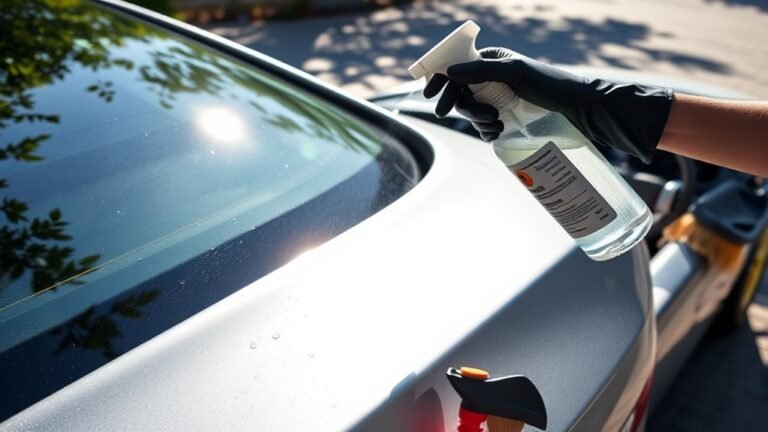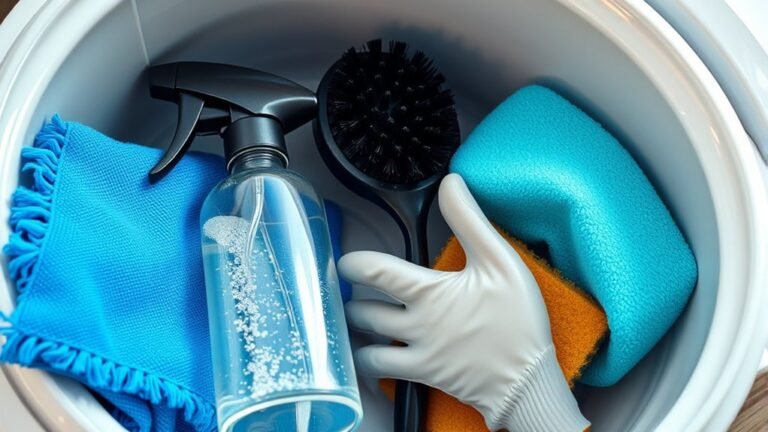Cleaning Mistakes That Damage Your Garage
You’re damaging your garage if you use harsh chemicals on floors, which can degrade concrete and coatings. Avoid abrasive tools that scratch surfaces and never overuse water on porous floors, leading to erosion or mold. Promptly tackle oil stains to prevent deep damage. Also, neglecting regular concrete sealing invites costly repairs, while improper storage of cleaning supplies risks spills and fumes. Plus, poor ventilation during cleaning increases health hazards. Keep these in mind to protect your garage—there’s more to guarantee its longevity and safety.
Using Harsh Chemicals on Garage Floors

Although harsh chemicals might seem like a quick fix for tough stains on your garage floor, they can actually cause more harm than good. These substances often degrade the concrete surface, leading to cracks and weakening the floor’s integrity. Instead of risking damage, consider safer chemical alternatives like biodegradable cleaners or enzyme-based solutions that effectively break down stains without compromising floor protection. You’ll maintain the durability of your garage floor while keeping your environment safer and less toxic. Choosing the right cleaning agents not only preserves your floor’s lifespan but also gives you the freedom to clean confidently, knowing you’re not accelerating wear or introducing harmful residues. Prioritize smart cleaning choices, and your garage floor will stay strong and pristine for years to come.
Ignoring Proper Ventilation During Cleaning
You need to guarantee proper ventilation when cleaning your garage to prevent harmful fumes from building up. Poor airflow increases health risks and can make cleaning chemicals more dangerous. Open windows, use fans, or keep the garage door ajar to maintain safe air circulation throughout the process.
Importance of Airflow
When cleaning your garage, neglecting proper ventilation can lead to a buildup of dust, fumes, and moisture that not only hampers your health but also damages stored items. You need to prioritize airflow benefits by implementing effective ventilation techniques. Open windows and doors to create cross-ventilation, or use fans to circulate air and expel contaminants. If possible, install vents or exhaust fans to maintain consistent airflow during and after cleaning. This prevents moisture accumulation, mold growth, and lingering odors that can deteriorate your belongings. Proper airflow also speeds up drying times, reducing downtime and letting you enjoy your space sooner. Remember, maintaining good ventilation isn’t just about comfort—it’s a practical step to protect both your health and the longevity of everything stored in your garage.
Risks of Poor Ventilation
Proper airflow is more than just a convenience—it plays an essential role in preventing serious issues during garage cleaning. When you ignore ventilation systems, harmful fumes from cleaning chemicals and dust particles can accumulate, drastically reducing air quality. This buildup not only poses health risks like headaches, dizziness, or respiratory irritation but also increases the chance of lingering odors and potential fire hazards. Poor ventilation traps moisture, encouraging mold growth and structural damage to your garage over time. By neglecting proper airflow, you’re compromising both your safety and the integrity of your space. Remember, effective ventilation isn’t optional; it’s a critical component that safeguards your freedom to clean efficiently and live comfortably in your garage environment.
Ventilation Tips for Safety
Although it’s easy to overlook ventilation, ensuring adequate airflow during garage cleaning is essential for your safety and health. You need to prioritize airflow control by opening windows and doors to create cross-ventilation that disperses fumes from cleaning products and dust. Using fans can further enhance air circulation, preventing the buildup of harmful vapors. Don’t skip on safety equipment—wear a respirator mask and protective eyewear to shield yourself from airborne irritants. Avoid working in enclosed spaces without ventilation, as toxic gases can accumulate quickly. Regularly check that your airflow control measures are functioning properly to maintain a safe environment. By managing ventilation correctly, you protect your respiratory system and maintain the freedom to clean your garage without risking your well-being.
Overusing Water on Porous Surfaces
You might think more water means a cleaner garage, but overusing it on porous surfaces can cause serious damage. Excess moisture seeps in, leading to erosion and creating the perfect environment for mold and mildew to thrive. To protect your garage, control the amount of water you use and dry surfaces thoroughly.
Water Absorption Risks
One common mistake when cleaning your garage is using too much water on porous surfaces like concrete or wood. Excess water leads to moisture buildup, which can cause water damage, weaken structural integrity, and foster mold growth. To protect your garage, you need to control how much water you use and dry surfaces promptly.
| Surface Type | Risk Level | Recommended Action |
|---|---|---|
| Concrete | Moderate moisture buildup | Use minimal water; dry quickly |
| Wood | High water damage risk | Avoid soaking; wipe with damp cloth |
| Drywall | Severe damage potential | Keep dry; spot clean only |
| Metal | Rust risk from trapped moisture | Wipe dry immediately after cleaning |
Avoid overwatering to maintain your garage’s durability and freedom from costly repairs.
Surface Erosion Effects
Excessive water not only causes moisture buildup but also accelerates surface erosion, especially on porous materials like concrete and wood. When you overuse water during cleaning, you risk surface degradation that weakens these materials over time. Porous surfaces absorb water quickly, making them vulnerable to repeated wetting and drying cycles that chip away at their integrity. To protect your garage, monitor your cleaning frequency carefully—using water sparingly and only when necessary. Instead, opt for damp wiping or using specialized cleaning products designed for porous surfaces. By controlling how often and how much water you apply, you’ll preserve the longevity and strength of your garage floors and walls. This careful approach keeps your space durable while giving you the freedom to maintain it without causing damage.
Mold and Mildew Growth
Although keeping your garage clean is important, overusing water on porous surfaces can create ideal conditions for mold and mildew growth. Excess moisture seeps into concrete or wood, fostering an environment where mold thrives. To guarantee effective mold prevention and ease mildew removal, consider these tips:
- Limit water usage on porous areas to avoid saturation.
- Use a dehumidifier to maintain low humidity levels.
- Clean spills promptly to prevent moisture buildup.
- Apply mold-resistant sealants to vulnerable surfaces.
- Ensure proper ventilation to facilitate drying.
Neglecting to Remove Oil Stains Promptly
A single oil stain left untreated can quickly become a stubborn blemish that’s nearly impossible to remove. When you neglect oil stain removal, the spill seeps deeper into your garage’s concrete, compromising its integrity and making future cleaning efforts far more difficult. Prompt action is essential; use absorbent materials like cat litter or sawdust immediately to soak up excess oil. Follow up with a degreaser specifically designed for concrete maintenance to break down remaining residue. Delaying this process not only stains your garage floor but also accelerates concrete deterioration, reducing its lifespan. By addressing oil stains quickly, you maintain a cleaner, safer space and protect your garage’s foundation, giving you the freedom to use it without worrying about permanent damage or costly repairs down the road.
Using Abrasive Tools That Scratch Surfaces

Often, people reach for abrasive tools like wire brushes or steel wool to tackle tough garage grime, not realizing these can damage surfaces instead of cleaning them. Using the wrong abrasive tool types can cause scratches, dull finishes, and weaken protective coatings. To maintain surface protection, choose your cleaning tools carefully. Avoid:
- Wire brushes on painted or sealed floors
- Steel wool on delicate plastics or rubber
- Harsh scouring pads on metal fixtures
- Sandpaper on epoxy coatings
- Metal scrapers on concrete surfaces
Instead, opt for softer brushes, microfiber cloths, or non-abrasive sponges. By selecting the right tools, you’ll clean effectively without compromising your garage’s surfaces, preserving their look and durability, and keeping your space as free and functional as you want it to be.
Failing to Seal Concrete Floors Regularly
Neglecting to seal your concrete floors regularly can lead to costly damage and labor-intensive repairs. Concrete is porous and absorbs moisture, oils, and chemicals, which degrade its surface over time. To maintain your garage floor’s integrity and appearance, you must understand sealing frequency and sealant types. Here’s a quick guide:
| Sealant Type | Ideal Sealing Frequency | Benefits |
|---|---|---|
| Acrylic | Every 1-2 years | Affordable, easy to apply |
| Epoxy | Every 3-5 years | Durable, chemical resistant |
| Polyurethane | Every 2-4 years | UV resistant, glossy finish |
| Penetrating Sealer | Every 5 years | Deep protection, breathable |
| Polyaspartic | Every 5-7 years | Fast curing, extremely tough |
Stay proactive with sealing. It preserves freedom from pricey repairs and keeps your garage floor looking sharp.
Storing Cleaning Supplies Improperly in the Garage

When you store cleaning supplies improperly in your garage, you risk spills, chemical reactions, and even accidents that can compromise your safety and damage your belongings. Proper cleaning supplies organization is crucial for maintaining a safe, efficient space. To avoid costly mistakes, follow these practical guidelines:
- Store chemicals in sturdy, clearly labeled containers.
- Keep incompatible substances separated to prevent dangerous reactions.
- Utilize wall-mounted racks or cabinets to keep supplies off the floor.
- Guarantee proper ventilation to minimize fumes and odors.
- Dispose of hazardous materials according to local hazardous material disposal regulations.
Häufig gestellte Fragen
How Often Should I Deep Clean My Garage to Prevent Damage?
You should set your deep cleaning frequency at least twice a year to maintain a clutter-free, damage-resistant garage. Regularly tackling dirt and debris prevents long-term wear on your floors and walls. Combine this with smart garage organization tips like using shelves and labeled bins to keep everything accessible yet tidy. Staying consistent with these practices guarantees your garage remains a functional, damage-free space where you enjoy freedom and ease.
What Are the Safest Cleaning Products for Garage Shelves?
Think of your garage shelves as the backbone of your space—it’s essential to treat them well. You’ll want to use eco-friendly cleaners that’re tough on grime but gentle on surfaces, preventing damage and keeping your shelf organization neat. Avoid harsh chemicals; instead, opt for natural solutions like vinegar or plant-based sprays. This way, you maintain a clean, healthy environment while preserving your freedom to store and access your items effortlessly.
Can Pets Cause Damage to Garage Surfaces During Cleaning?
Yes, pets can cause damage to garage surfaces during cleaning if their behavior isn’t managed properly. They might scratch floors, knock over cleaning products, or spread dirt. To protect your surfaces, consider restricting pet access while you clean and use barriers or covers on vulnerable areas. Understanding pet behavior helps you plan surface protection effectively, ensuring your garage stays safe and clean without limiting your freedom to maintain it efficiently.
How Do Temperature Fluctuations Affect Garage Cleaning Routines?
Did you know temperatures in garages can swing over 40 degrees in a single day? These temperature extremes really impact your cleaning schedules. When it’s too hot or cold, cleaning solutions might not work effectively, and surfaces can become more fragile. You’ll want to adjust your routine to milder times of day to avoid damage. By doing this, you maintain freedom to clean efficiently without risking wear or cracks on your garage surfaces.
Is It Necessary to Clean Garage Windows Regularly?
Yes, regular cleaning of your garage windows is vital for proper window maintenance. Dirt and grime build-up can reduce natural light and may cause long-term damage if neglected. Adjust your cleaning frequency based on your local environment—dusty or rainy areas might require monthly cleaning, while others could manage quarterly. Staying consistent guarantees your garage stays bright and inviting, giving you the freedom to use the space comfortably and efficiently.






